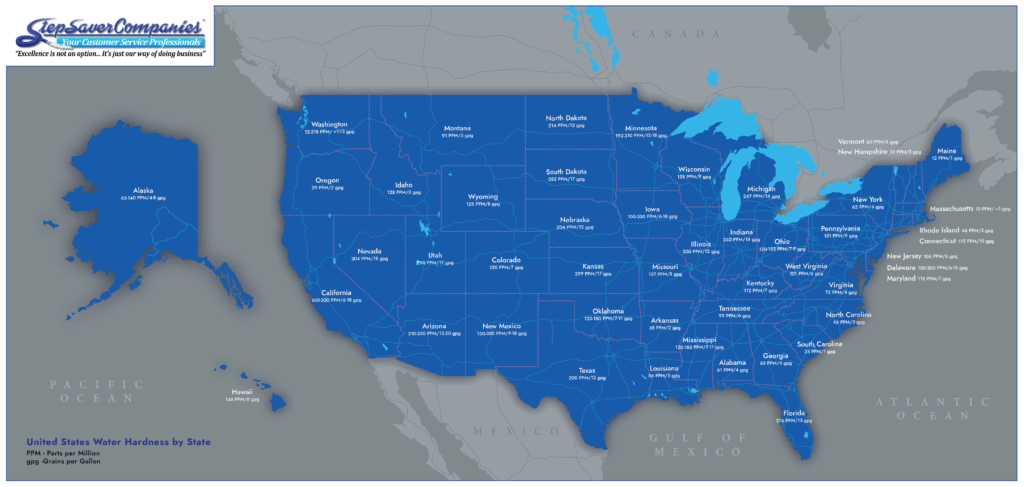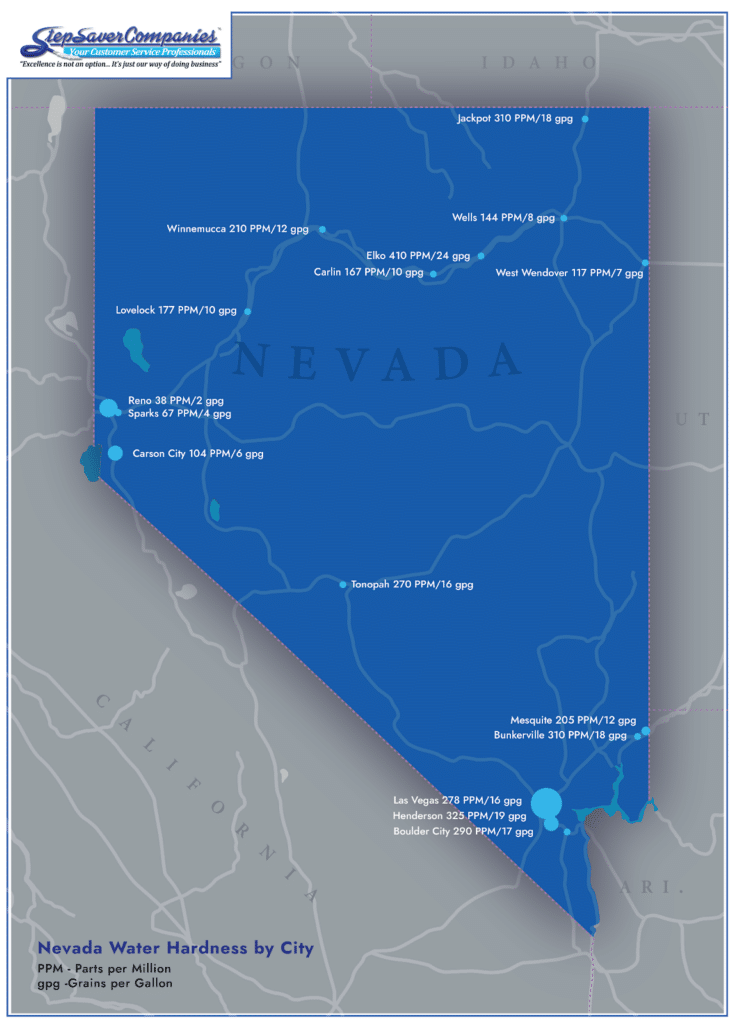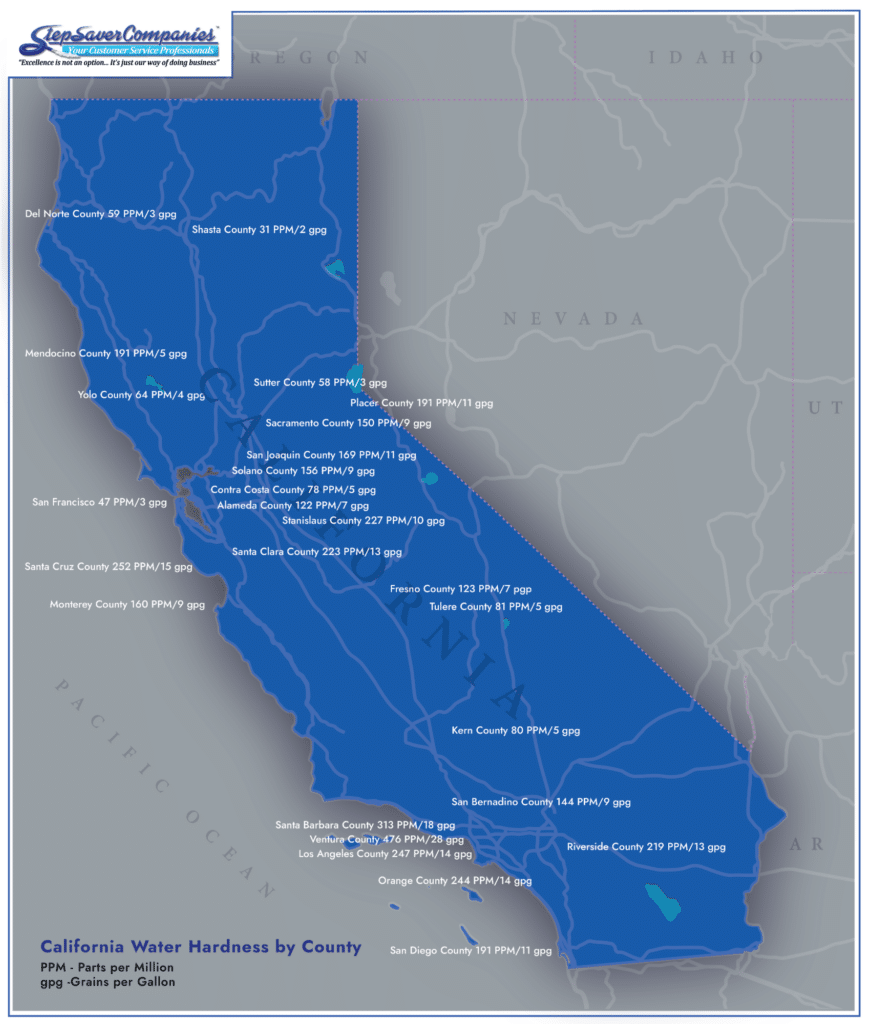Could the water running through your business be causing costly damage behind the scenes? From equipment wear and scale buildup to cleaning inefficiencies and customer satisfaction issues, hard water can seriously impact daily operations. Knowing your state’s average hardness level is the first step in protecting your investment. In this guide, we’ll break down average water hardness levels by each area in the US—so you can assess the risk, make informed decisions, and keep your business running smoothly with properly treated water.
What is Water Hardness?
Water hardness levels refer to the amount of dissolved minerals, especially magnesium ions and calcium carbonate, present in your water. Water becomes hard when these minerals move through limestone and other rock formations, eventually entering and dissolving in your water. This is known as the “hydrologic cycle,” when water percolates through the earth and picks up these minerals. Hard water is tough on appliances and plumbing, causing mineral buildup, clogged pipes, and potentially damaging water heaters. It’s attributed to accelerating the degradation of equipment and impacting how detergents perform, leading to less effective cleaning agents.
Water hardness is measured in parts per million (PPM) or grains per gallon (gpg) and is used to express the concentration of minerals in the water. Here’s a general rule of thumb for interpreting these measurements:
- Soft Water: Less than 60 PPM or 3.5 gpg
- Slightly Hard Water: 60–120 PPM or 3.5–7 gpg
- Moderately Hard Water: 121–180 PPM or 7–10 gpg
- Hard Water: 181–250 PPM or 10.5–14.5 gpg
- Very Hard Water: More than 250 PPM or 14.5 gpg
Typically, soft to slightly hard water is ideal to prevent mineral buildup and reduce the efficiency and durability of equipment or appliances.
How to Know if You Have Hard Water in Your Region
The best way to know if you have hard water in your area is to order a water testing kit, which can measure the grains per gallon (gpg) or parts per million (ppm) of minerals (like calcium and magnesium) in your water. If you don’t want to buy a kit, here are 4 signs that your water could be hard:
1. Spots or Film on Dishes and Fixtures
Hard water leaves behind white, chalky residue—usually calcium or magnesium—on:
- Glassware
- Faucets
- Showerheads
- Sinks or dishwashers
2. Soap Scum and Poor Lathering
Soap and detergent don’t lather well in hard water. Instead, they form a sticky residue called soap scum, which can build up on:
- Bathroom tiles
- Sinks
- Laundry
- Hands and skin (leaving them feeling dry or filmy)
3. Scale Buildup in Pipes or Equipment
Over time, hard water can lead to mineral deposits (scale) inside plumbing or appliances such as:
- Water heaters
- Coffee machines
- Boilers
4. Higher Utility Bills
If scale builds up in pipes and appliances, it makes them work harder, especially water heaters, resulting in:
- Reduced efficiency
- Higher energy costs
Water Hardness in Your Area: Hardness Levels by State
Water hardness varies by zip code, and each state has vastly different levels of hard to soft water. Fortunately, we’ve researched for you and have a rundown of each state’s average water hardness levels, helping you determine if your location has hard or soft water. Utah is generally known to have the hardest water, followed by Nevada, California, and Arizona. Compared to coastal and northeastern states, these western states have harder water due to their geology and arid climate. The region’s water often originates from mineral-rich sources such as limestone aquifers, which release high levels of calcium and magnesium into the water supply. Lower rainfall and higher evaporation rates also concentrate these minerals, further increasing water hardness.
Here’s our map of the United States, featuring the average hardness levels of each state across the country:

How to Soften Hard Water: 3 Tips
Hard water can leave behind mineral buildup, reduce the efficiency of appliances, and cause dry skin or dull laundry. Here are three practical ways to soften your water and improve overall water quality:
1. Install a Water Softener System
A traditional ion-exchange water softener is one of the most effective solutions. It replaces calcium and magnesium ions with sodium or potassium ions, softening the water as it enters your building. This type of system is ideal for:
- Whole-home or commercial water treatment
- Preventing scale buildup in pipes and appliances
- Extending the lifespan of water-using equipment
It’s important to consistently perform maintenance check-ups on your water softener system to ensure it’s working correctly and built to last.
2. Try a Salt-Free Water Conditioner
A salt-free water conditioner may be a good alternative if you’re looking for a low-maintenance or eco-friendly option. These systems use a physical process (like template-assisted crystallization) to prevent minerals from sticking to surfaces, rather than removing them. While they don’t technically “soften” water, they can:
- Reduce scaling
- Require no salt or electricity
- Be easier to install and maintain
3. Use Water Softening Additives for Specific Applications
For smaller-scale issues, such as hard water in laundry or dishwashing, you can use water-softening products like:
- Washing soda or borax (for laundry)
- Rinse aids or citric acid (for dishwashers)
- Showerhead filters with softening media
These are quick fixes and great for renters or those not ready for a complete system installation. However, this won’t be effective for business owners and larger corporations.
Work With Step Saver for Lasting Water Treatment
Have you discovered that your area has hard water after reading this article? If you’re a business owner, this could have expensive consequences. Fortunately, Step Saver’s team serves Utah, Nevada, and California businesses, helping to solve hard water issues. We provide installation, repair, maintenance, and replacement services for commercial water softeners—plus reliable salt delivery—so your system stays efficient and your water stays treated 100% of the time. The hard water in your area could be turning away customers, damaging your equipment, and costing you unnecessary expenses. Contact our commercial water softener experts to save money, impress customers, and ensure longevity for your equipment and appliances.


